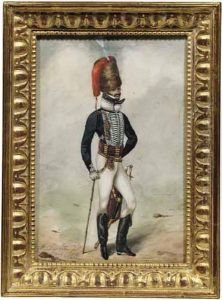Robert Dighton Jnr. Paintings
Robert Dighton Jr. was a British artist known for his satirical prints and theatrical portraits, continuing the artistic legacy of his father, Robert Dighton (1752-1814), who was also a prominent caricaturist and portrait painter. Born into a family deeply entrenched in the arts, Dighton Jr. grew up in an environment that nurtured his artistic talents from a young age. His early life was heavily influenced by his father's work and reputation, which provided him with a strong foundation in the arts, as well as an intricate understanding of satire and caricature.
Dighton Jr.'s career began in earnest in the early 19th century, a period that saw a burgeoning interest in satirical prints and caricatures, partly as a means of public commentary on politics, society, and personalities of the day. He capitalized on this trend, producing works that were not only humorous but also insightful, showcasing a keen eye for detail and a sharp wit. Unlike his father, who was known for his gentle satire, Dighton Jr.'s work often carried a sharper edge, reflecting the changing tastes and societal attitudes of the time.
Throughout his career, Dighton Jr. contributed significantly to the world of British caricature, a genre that was at its peak during the Georgian and early Victorian eras. His works were published in various formats, including single-sheet prints and contributions to periodicals, making his satirical commentary widely accessible to the public. Additionally, Dighton Jr.'s theatrical portraits are of particular note. These works captured the essence of contemporary actors and actresses, contributing to the historical record of British theatre in the 19th century.
Despite his contributions to British art and culture, Robert Dighton Jr.'s life and work have not been as extensively documented or celebrated as those of some of his contemporaries. However, his prints and portraits remain valuable for their artistic merit and as historical documents that offer insights into the social and cultural dynamics of his time. Dighton Jr.'s legacy lives on through his contributions to the genre of caricature and portraiture, offering a unique window into the world of 19th-century Britain.
Dighton Jr. passed away in 1865, leaving behind a body of work that continues to be appreciated by art historians and collectors for its wit, insight, and artistic quality. His contributions to the arts underscore the importance of satire and caricature as critical and creative means of social commentary, a tradition that remains vibrant to this day.
